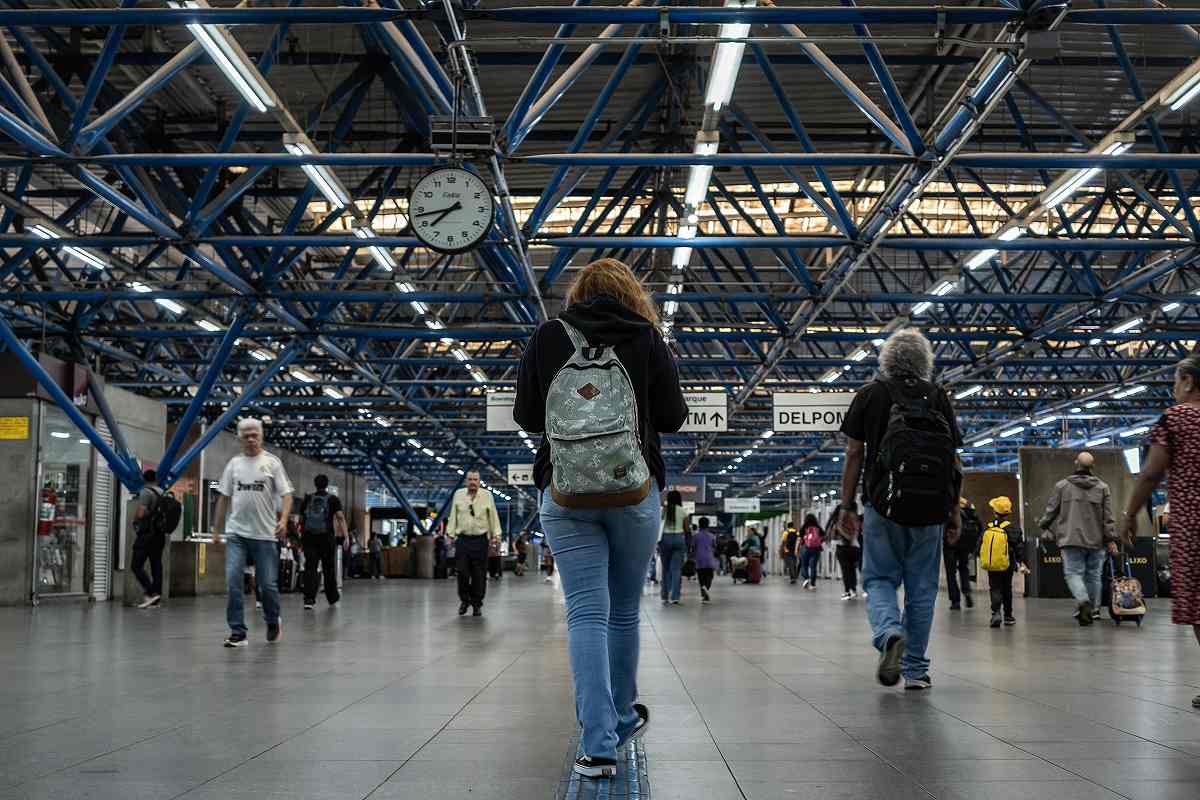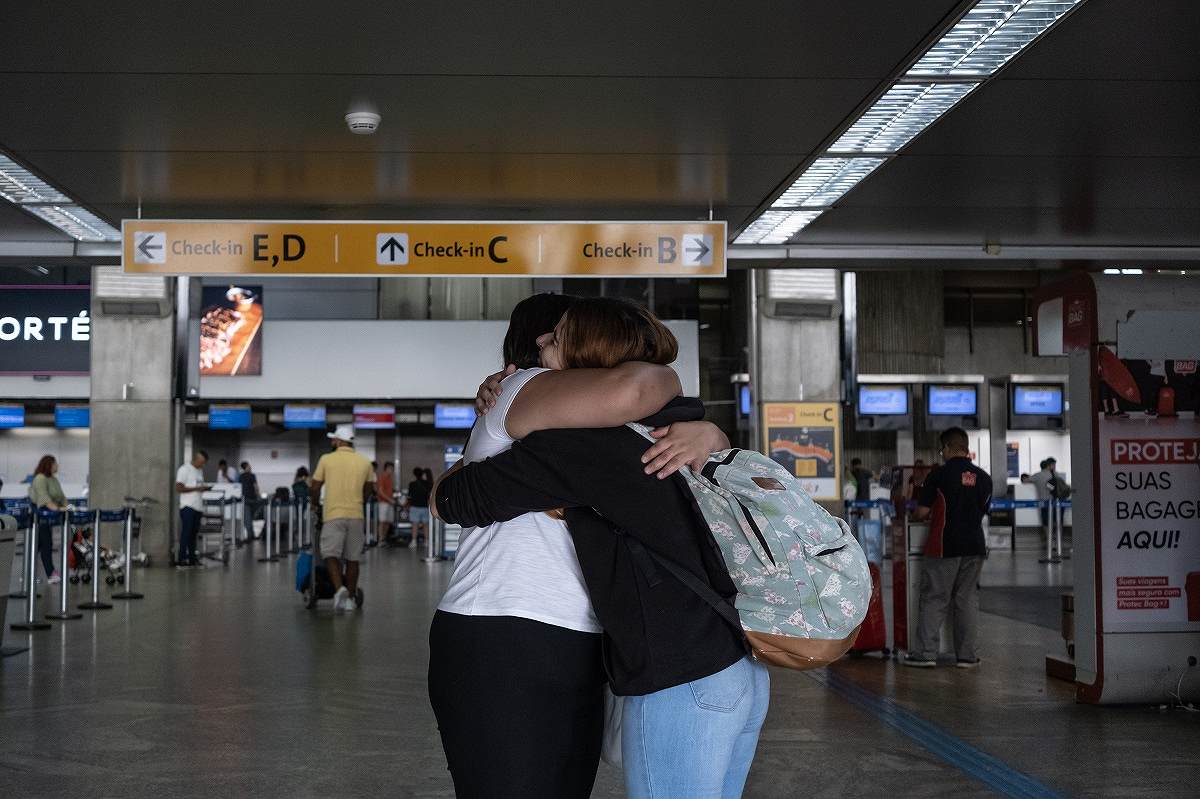
After an overnight bus journey from her rural town in Brazil, Cristina arrives in São Paulo’s Barra Funda bus terminal, where she then caught a train to the airport.
14:57 JST, February 24, 2024
SÃO PAULO, Brazil – She’d taken an overnight bus from the countryside, then a train across the urban sprawl of São Paulo, and now she was staring out the plane window, head full of worry. There was a pink rosary in her pocket. But she didn’t see the point of praying. She feared she was a sinner, a criminal, and this trip, her first time out of Brazil, would be a secret she’d carry for the rest of her life.
Cristina was 35 years old. She was 11 weeks pregnant. She came from a conservative Christian family in a conservative Christian nation where abortion was largely illegal, so she’d decided to travel to a country where it was not and bring an end to the pregnancy she didn’t want.
Not that long ago, such a trip would have almost certainly meant a journey out of Latin America, which historically has had some of the world’s most restrictive abortion policies. But in the past five years, several of the region’s most populous countries have either decriminalized or legalized the procedure, reconfiguring the geography of abortion in Latin America and opening a pathway for women who want to end their pregnancies but live in countries where it’s prohibited.
Cristina, who allowed Washington Post journalists to join her on her trip on the condition that she be identified only by her middle name out of concern about the social stigma, is one of hundreds of Latin American women – if not thousands – who in recent years have decided to take that path, according to interviews with advocates, researchers, abortion clinicians and women across the region.
The journeys mirror those increasingly made in the United States, where women now routinely travel out of state in search of abortions after the U.S. Supreme Court’s rejection of Roe v. Wade, overturning the fundamental right to an abortion, led to a flurry of local bans. But in Latin America, where a rising feminist movement is challenging historic Catholic conservative values, women are traveling because of new opportunities to have the procedure.
In 2021, Argentina legalized abortions, allowing the termination of pregnancies up to 14 weeks. Then Colombia decriminalized the procedure in 2022, permitting abortions up to 24 weeks. And last year, Mexico’s Supreme Court decriminalized abortion federally, effectively permitting the procedure at all federal health facilities nationwide.
But Brazil, which accounts for half of South America’s population and territory, has not budged on the issue. The procedure remains illegal except in cases of rape, risk to the mother’s life or cases of fetal anencephaly. Though incarceration is rare, illegal abortions are punishable by up to three years in prison.
It’s impossible to say how many Brazilian women travel abroad for an abortion. Most women, advocates and researchers say, keep their trip a secret.
Cristina, too, had vowed to keep it quiet. But as her Argentina-bound plane rolled onto the runway that January morning, that secrecy was another reason for trepidation.
Any challenge she’d encounter on this journey – where she’d undergo the most sensitive health procedure of her life in a country where she didn’t speak the language – would be hers alone to overcome.
The plane sped up and lifted off. She grasped her seat and closed her eyes.
– – –
An unknown possibility
As soon as Cristina found out she was pregnant, at four weeks, she knew she wanted an abortion. She said the desire went against everything she’d been raised to believe as a Catholic and heard at church. But she didn’t have a job. She wasn’t married. Both of her parents were deceased. If Cristina separated from her boyfriend, she didn’t believe she could care for a child on her own.
At her home in rural São Paulo state, one of Brazil’s most conservative areas, she spent weeks researching what to do, she recalled, and came to understand the enormous legal, health and social risks assumed by Brazilians who abort their pregnancies.
She saw that clandestine abortions, which number in the hundreds of thousands every year in Brazil, was one of the leading causes of maternal mortality, according to Brazilian public health researchers. Women pursued such procedures at underground clinics, where the threat of prosecution and arrest was unlikely, but not infeasible. Just last February, a woman who got an abortion at one such clinic in São Paulo was arrested.
Next Cristina investigated using the abortion pill misoprostol, widely used in the United States but whose sale has been banned in Brazil since 1998. She discovered she could secure it on an online black market. But she balked at the price, roughly $160, and worried about what effects it would have on her body if the pill turned out to be fake or dangerous.
Finally, she said, she came across an article that informed her of a possibility she hadn’t known about. “I went to Argentina to get a legal abortion and regained my will to live,” the Brazil Marie Claire headline said.
The woman in the article, whose story seemed so similar to Cristina’s, had found travel funding and assistance through an abortion rights organization called Projeto Vivas. Cristina reached out and soon heard back.
The organization would fund her entire trip from rural São Paulo state to metropolitan Buenos Aires.
– – –
An informal network
There is little indication Brazil will follow its neighbors and loosen abortion restrictions anytime soon. Many oppose incarcerating women who abort pregnancies, but polls consistently show most Brazilians oppose the procedure’s legalization. A Supreme Court hearing on abortion last year, which could have provided an avenue to its decriminalization, was scrapped and hasn’t been rescheduled.
The legal differences among Latin America’s major powers have given rise to an informal network of nongovernmental organizations, activists and abortion clinics who work – sometimes publicly, but more frequently in secret – to provide regional travel assistance and funding to pregnant women who live in countries where abortion remains illegal.
Two leading Brazilian women’s rights organizations say they’ve cumulatively sent nearly 800 women abroad in recent years. In Argentina, the primary destination abroad, clinics report they’ve seen an influx of foreigners, primarily Brazilian. One clinic in the city of Rosário said half of its abortions are performed on Brazilians. Another said 10 percent were on foreign women.
In Colombia, where abortion was decriminalized more recently, rights groups Batucada Sur-versiva has assisted dozens of women in their journey to the country. And even in closely monitored Venezuela, where abortion is largely illegal, one advocacy group said it will provide logistical guidance to women interested in traveling to Colombia.
Many more women travel in secret, without any institutional support, said Debora Diniz, coordinator of Brazil’s National Abortion Survey. “With borders so porous,” she said, “and the ease of traveling between countries, more vulnerable women are preferring to travel than get a clandestine abortion in their own countries.”
– – –
‘Don’t tell them’

Cristina hugs Rebeca Mendes, founder of the Vivas Project, when they meet for the first time at Guarulhos airport in São Paulo. The organization helps people access legal abortion services in Latin American countries.
Cristina said her boyfriend had begged her not to go. He told her she was committing murder. But her mind was made up. She left for São Paulo on an overnight bus.
The only person to meet her at the São Paulo International Airport was Projeto Vivas’s director, Rebeca Mendes, one of Brazil’s most prominent abortion rights activists.
“Does anyone know you’re traveling?” Mendes asked. “Did you tell your parents?”
“They’re gone,” Cristina said. “I have two sisters, but I didn’t tell them. They are very conservative.”
Mendes frowned.
“Don’t tell them,” she advised. “You don’t need criticism from those who are close to you.”
For the next two days, Cristina thought about those words. She remembered them when she landed in Argentina and had no one to message besides her boyfriend. And again when she walked the streets of a Buenos Aires, fumbling to communicate in Spanish, a language she didn’t speak. And then again, as she entered a historic building in the busy neighborhood of Almagro, stepping into a brightly lit abortion clinic.
There were people all around. But she felt alone.
– – –
A new sense of normalcy
Seven weeks of constant worry. More than 1,660 miles traveled. Nine pounds lost from anxiety. All of it leading to this moment. Which, now that Cristina was living it, did not seem all that scary.
No one judged her. Everyone treated her warmly. There was a nurse who spoke fluent Portuguese who helped Brazilian travelers.
Forms were signed, pills taken and $205 paid. She was surprised by how routine, relatively painless and quick – less than 15 minutes – the procedure was. The nurse told her she had to go 10 days without exercising. Then she could get back to her what he called “normal life.”
Back outside the nonprofit clinic, on the busy streets of Almagro, Cristina thought about what that meant. Normalcy to her was constant communication with her sisters and weekend gatherings at their houses. Visits to friends. Drives through a conservative Christian community where she believed just about everyone would condemn her if they knew what she had done.
She got in an Uber and left for the airport. She looked out the window. She felt changed by this experience, but had no one with whom she could honestly share it.
“I’m relieved,” she said. “But sad.”
Her world was not the one she saw outside the window, where feminist activists had carried green flags and etched Latin America’s first major abortion rights victory.
Her world was Brazil, where President Luiz Inácio Lula da Silva was vilified during the last presidential campaign for calling abortion a matter of health care. Where health officials say unsafe abortions kill a woman every two days.
Hours later, she made it back to Brazil. Rain had enshrouded São Paulo. She called her boyfriend. The conversation was brief, logistical. She told him when she’d be home. He asked how she was feeling physically, but not emotionally.
After arriving home the next morning, following another overnight bus trip across the state, she spent most of the day sleeping, exhausted from her journey. She awoke to see messages from her sisters. She answered only a few. Then she canceled plans to see them that weekend.
She was back to her regular life, but so far, it didn’t feel normal.
Top Articles in News Services
-

Survey Shows False Election Info Perceived as True
-

Hong Kong Ex-Publisher Jimmy Lai’s Sentence Raises International Outcry as China Defends It
-

Japan’s Nikkei Stock Average Touches 58,000 as Yen, Jgbs Rally on Election Fallout (UPDATE 1)
-

Japan’s Nikkei Stock Average Falls as US-Iran Tensions Unsettle Investors (UPDATE 1)
-

Trump Names Former Federal Reserve Governor Warsh as the Next Fed Chair, Replacing Powell
JN ACCESS RANKING
-

Producer Behind Pop Group XG Arrested for Cocaine Possession
-

Japan PM Takaichi’s Cabinet Resigns en Masse
-

Man Infected with Measles Reportedly Dined at Restaurant in Tokyo Station
-

Israeli Ambassador to Japan Speaks about Japan’s Role in the Reconstruction of Gaza
-

Videos Plagiarized, Reposted with False Subtitles Claiming ‘Ryukyu Belongs to China’; Anti-China False Information Also Posted in Japan
























